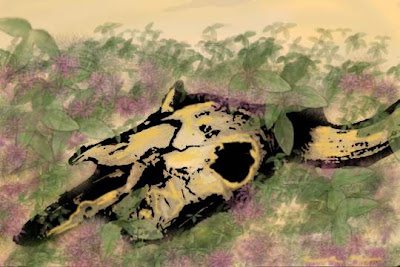Now it’s time for another pass through your poem, the final pass if you’re confident, one of many final passes if you’re an incessant tinkerer. (Not that I would know anything about that ….) If you find yourself skimming through the poem, or feel sick of it, put the poem away and revise another day. The object is to look at it with fresh eyes, as if you flipped open a magazine and saw it for the first time.
These steps can be integrated with Part One revisions, or done separately, depending on how you work best. Examine your word choices. Are they appropriate for the poem? Is there another word that conveys your overall idea better? Make every word in your poem pull its weight - use strong verbs. Is your poem predictable? Part of the charm of poetry is a work turning your expectations sideways, or even upside down. If I know how it’s going to end, why should I read further? On the other hand, too much disassociation between reader and poem is what makes the audience believe poetry is only for ‘snobs’ and the literati. Reader accessibility is important. Who is your target audience?
Just like a novel, your poem tells a story. How it tells the story is up to you. Is it a mystery, a thriller, a romance? Does your language reflect your poem/story? Are your lines and stanzas lyrical, short and to the point, or dense and chewy? Don’t forget about pacing. You don’t want your reader skimming over the stanzas to get to the end. Take them along for the ride, let them enjoy the trip. Does your poem shoot the rapids, or canoe along the shore?
Can you reorder the poem to make it more exciting? Will shifting stanzas change the meaning of the poem? Maybe changing the meaning leads you in a direction you never would have considered otherwise. How much poem can you remove and still have it make sense? How much poem can you add, and still maintain tension? Change stanzas in a poem, lines in a stanza, words in a line. Open yourself to the possibilities.
The thought to keep in mind through all revisions – What am I trying to say here?
Distance yourself from your work. Step back, remove the rose-tinted glasses, and shine a halogen spotlight on the poem. Sometimes when we’re too close to a subject, our attempts to write a poem about it come off as syrupy or maudlin. Can you remove yourself, the “I”, from the poem and still tell the story? Should the poem about a relative’s fight with cancer be told from your POV, the relative’s, from that of a nurse, or a delivery person passing down the hall outside the chemotherapy rooms? Each time you switch perspectives, you open up new possibilities for telling the poem/story. Maybe your love life crashed and burned for the fifteenth time, but no one really wants another poem that whines about how unlucky in love you are. Make the experience something your audience can relate to - Everyone’s been there - But - How do you approach the subject in a fresh way? What’s general about your experience as well as unique? Try humor. Find the universals and use them to draw your readers in.
Remember - It’s Not About You.
Research – it’s not just for novels. A false fact will make the reader uncomfortable at best, at worst? A blunder and they may never read your work again. You’ve lost credibility. Even if the reader doesn’t know exactly what’s wrong, most people have an innate bullshit detector that lets them know when a writer didn’t do his or her homework. The more ambitious reader will do the research you should have done on the subject – then rub your face in it. Publicly. Put forth your best effort with a poem, your readers will appreciate it. You may never hear the acknowledgment, then again, you might. I still hear from people about a poem on Gorgonzola cheese I read at a festival four years ago. I get accosted in the aisles at Wal-Mart. “Aren’t you the cheese poem lady?” Not necessarily the title I wanted, but the poem obviously struck a chord. I had one person tell me they even went out and tried Gorgonzola cheese thanks to my poem. Another wanted to know if I had any more ‘funny food’ poems. If I had to choose between being known for Shakespearian sonnets on metaphysics, or weird food poems … I’ll take weird food poems any day. It makes for interesting conversations.
When revising, trust your reader to be intelligent. You don’t need to spell out every detail. Don’t mediate between the reader and your poem. You won’t be there to interpret when the reader flips open a book and finds your poem. Your work has to stand on its own.
When is a poem finished? That’s a tough call. There comes a time when you have to back away from the poem and say, “That’s it. I’m done.” Leave it; stick it into your ‘finished’ folder, and move on to the next. I tend to write poems in batches, and revise in batches. Once you get your mind into revision mode, it goes easier. When I’m ready to submit, I open the poem and give it a once over, to make sure I didn’t overlook anything, or misspell a word. Since I’m not in ‘revision’ mode, I can resist the urge to tinker yet again. Usually ....
It’s a never ending process. I have poems in print I’ve revised yet again. I want my best work out in the world. There are poems from years ago I cringe at, but also there are old poems with a snippet of something good hidden in their clumsy verse. I steal the good and rework the idea. (Can you steal from yourself??) We all learn more tools and tricks as we gain experience *coughs* - get older - so apply that knowledge to your poems. You readers will thank you for it.

















